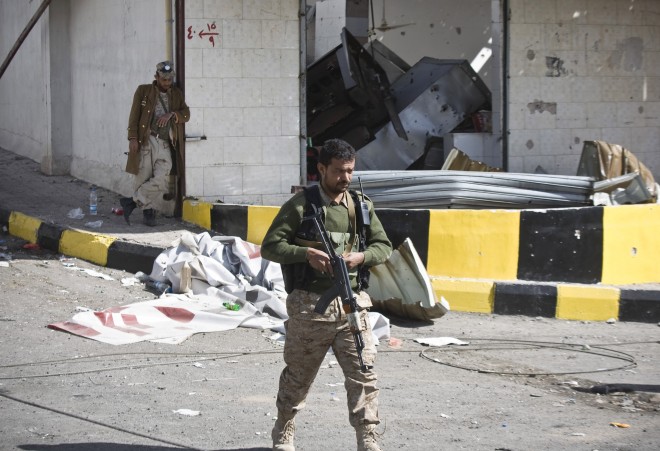
Houthi Shiite Yemeni wearing an army uniform stand guard in front of a building damaged during recent clashes near the presidential palace in Sanaa, Yemen, Tuesday, Jan. 20, 2015. Shiite militiamen seized the presidential palace in Yemen’s capital Tuesday in what a minister said was a bid to overthrow President Abdrabuh Mansur Hadi and his US-backed government. AP photo/hani mohammed
SANAA, Yemen–Shiite militiamen seized the presidential palace in Yemen’s capital Tuesday in what a minister said was a bid to overthrow President Abdrabuh Mansur Hadi and his US-backed government.
Witnesses said the heavily armed gunmen were also clashing with troops outside the residence of Hadi, who was reportedly inside receiving visitors at the time of the attack.
“The Yemeni president is under attack by militiamen who want to overthrow the regime,” Information Minister Nadia Sakkaf said on Twitter.
The fresh unrest came after the Huthi militiamen, who have tightened their grip on Sanaa since overrunning it unopposed in September, surrounded the prime minister’s residence at the end of a bloody day on Monday.
Prior to the attack on the presidency, the government had sought to hold “urgent” talks Tuesday to produce a roadmap to end violence.
The United Nations Security Council is to hold closed door consultations about the worsening crisis Tuesday, with special envoy Jamal Benomar to report on the latest developments.
Pitched battles had erupted on Monday near the presidential palace and in other parts of Sanaa, before a ceasefire was agreed between ministers and a Huthi representative.
At least nine people were killed, including fighters from both sides, and 67 wounded, as the militia seized an army base overlooking the complex and took control of state media.
Yemen has been wracked by unrest for months, raising fears of a collapse of Hadi’s government, a crucial ally in Washington’s fight against Al-Qaeda.
Prime Minister Khalid Bahah escaped to his residence, where he has lived since taking office in October, after his convoy came under fire from Huthi fighters.
Huthi gunmen took up positions outside the residence late on Monday and were in control of all three of its entrances, government spokesman Rajih Badi told AFP.
After a lull overnight, fighting re-erupted on Tuesday near Hadi’s residence in western Sanaa when the Huthis attempted to set up a new checkpoint close by and were confronted by troops, the witnesses said.
They reported heavy clashes inside the complex in southern Sanaa, one of the few public buildings to remain outside the control of the Huthis since they overran the capital.
Tensions have been running high in Sanaa since the Huthis on Saturday abducted Hadi’s chief of staff, Ahmed Awad bin Mubarak, in an apparent move to extract changes to a draft constitution that he is overseeing.
Mubarak is in charge of a “national dialogue” set up after veteran strongman Ali Abdullah Saleh was forced from power in February 2012 following a year of bloody Arab Spring-inspired protests.
Shadow of ex-president Saleh
Saleh has been accused of backing the Huthis and a source in the presidential guard told AFP some Yemeni troops still loyal to the ex-leader had supported the militia in Monday’s fighting.
The source, speaking on condition of anonymity, said groups of soldiers and fighters left the Sanaa home of Saleh’s son Ahmed, Yemen’s current ambassador in the United Arab Emirates, “to lend a hand to Huthi fighters”.
Residents said some soldiers had also abandoned their positions on the hill overlooking the presidential palace without any resistance to the Huthis.
A Huthi fighter, who gave his name as Abu Hashem, said the militia had taken control of the area to prevent government forces from “shelling civilians.”
Before his kidnapping, Mubarak had been due to present a draft constitution dividing Yemen into a six-region federation, which the Huthis oppose.
The militants, who hail from Yemen’s remote north and fought a decade-long war against the government, have rejected the decentralization plan, claiming it divides the country into rich and poor regions.
Since their takeover of the capital, the Huthis, also known as Ansarullah, have pressed their advance into areas south of Sanaa, where they have met deadly resistance from Sunnis including Al-Qaeda loyalists.
Yemen’s branch of the jihadist network, Al-Qaeda in the Arabian Peninsula, is considered its most dangerous and claimed responsibility for this month’s attack in Paris on French satirical weekly Charlie Hebdo that left 12 dead.
Hadi’s government has been a key ally of the United States, allowing Washington to carry out repeated drone attacks on Al-Qaeda militants in its territory.–Jamal al-Jabiri